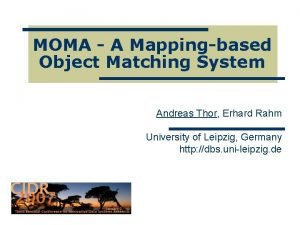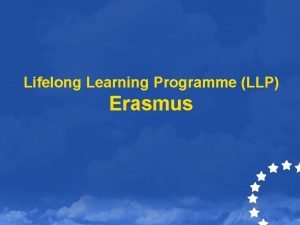Maria Montessori Lifelong Learning Programme MOMA MONTESSORI METHOD


- Slides: 2

Maria Montessori Lifelong Learning Programme MOMA – MONTESSORI METHOD FOR ORIENTING AND MOTIVATING ADULTS Project n. 527800 -LLP-1 -2012 -1 -IT-GRUNDTVIG-GMP EUROPEAN RESEARCH - LEAFLET Didactic Approaches And Innovative Educative Methods In Learning And Teaching Social Skills Connections Between The Lack Of Social Skills And The Participation In Training Activities Of The Socially Vulnerable Target-Groups There is a tight link between the skill formation and the quality of the education, as it is a continuous process of the educational system, intent on attaining an optimal stage in the personal, social, physical, and intellectual development of each individual, who will be given back to the society under the form of a ”product”. It is important to lay a bigger stress on the competency formation, as that will allow a better management of one’s own activity, as well as of the others’ activities: analytical thinking, efficient communication, counseling, creativity, decision-making, task assignment, focusing on results, influencing the others, data search and collection, reasoning, learning, management of the changes, motivation, stress management, negotiation and persuasion, problem-solving, self-confidence, strategic perspective. The European consortium has developed a research on the barriers in the education of the adult, from the vulnerable target groups in the context of implementing the project MOMA Montessori Method for Orienting and Motivating Adults. The main focus of the research is to study and analyze: • the characteristics and the reason of the social barriers to the access to the opportunity of education of adults living a social situation of hardship; • the correspondence between the increasing rate of lack of participation of adults and their lack of social competences in order to have all the available data for framing the Montessori for adults Method of Teaching and Learning social skills The analysis took into account the specificity of the different groups and particularly: minorities; immigrants, the Roma communities; adults with disabilities; adults living situations of poverty or familiar hardships, clients with mental disorders and adults senior living in deprivation areas. The general objective of European research is evaluating the status quo of the participation to the formal education, as far as the socially vulnerable/ underprivileged adult groups are concerned (needs, expectations, values, motivation), of the role and the efficiency of the schooling system in improving their prospective socio-professional success. The development of a constant identity is extremely important; and low competency level can act as a serious barrier in this sense. The lack of adequate abilities makes it so that the adults often face exclusion from the labor market and it reduces their chances of actively participating in the cultural, political, professional, economical and social life, and therefore they frequently face a range of serious issues, such as unemployment, financial difficulties, psychological and health issues, social exclusion. This project has been funded with support from the European Commission. This publication reflects the views only of the author, and the Commission cannot be held responsible for any use, which may be made of the information contained therein.

Lifelong Learning Programme MOMA – MONTESSORI METHOD FOR ORIENTING AND MOTIVATING ADULTS Project n. 527800 -LLP-1 -2012 -1 -IT-GRUNDTVIG-GMP EUROPEAN RESEARCH LEAFLET The adults with a high level of education have an easier access to schooling, whereas the adults who face social difficulties, have special needs/disabilities find it very hard to participate in lifelong learning programs. In many countries, the educational issue lasts throughout all the school years. These tendencies can only be changed if the policy makers in the field acknowledge the education as being of crucial importance. From the point of view of the adult education sector, the focus ought to be on the study of possible causes which lead to their lacks in education: • the adults either haven’t got the necessary experience, or they are not aware that their poor educational skills can generate problems for them; • the adults haven’t got the necessary experience to improve their knowledge; many adults with poor educational skills don’t know how to study and therefore they find it hard to adapt to a new learning situation; • the adults find it difficult to act as a “complete individual” as their communicative and their decision-making skills aren’t fully developed; • the lack of information regarding the skill-improvement educational opportunities. The scheme of the research was divided in two main areas: • analyzing the social barriers to the education in target groups of adults living a social hardship and analyzing the role of the reinforcement of the social skills in the access to the education; • analyzing the pedagogic approaches, related to the areas of the social competences, addressed to adults, based on participatory and cooperative methods. In each country a specific target group was analyzed, having a relevant view about their “diffidence” towards the formal adult education, and having a framework about their real obstacles that make difficult or impossible to take part in the opportunities of adult education. The research aimed to identify ways to increase the level of social and role emotional dimension in adults with specific situations of vulnerability. The research focused on the analysis results in enhancing the personality of the participants in interpersonal relations and in helping them to adapt or re-adapt to a social context / economic, intellectual and discovering new opportunities for new skills to deal with emotions, and increase self, to encourage adult participation in educational opportunities. In each country have realized research on the educational value of the Montessori method and its application to education for adults with special needs. There is an abundance of research projects and research studies concerning adult education in Germany. There are over 1. 000 schools and kindergartens in Germany that work according to the principles of the Montessori pedagogy. The principles of the reform pedagogy of Maria Montessori are also applied in homes for old people with dementia. An important element of the work is activating care that helps people suffering from dementia through development/improvement of the senses with specifically developed Montessori materials. Maria Montessori In UK Montessori methodology is an effective method for use with dementia patients. However the tasks developed for use with the method may prove limiting, thus one must take the philosophy of the method and apply it to the client group in question in order to create a set of activities that the client group in question will find the most fulfilling. Italy Montessori method applied since 1950 in secondary schools first grade and high schools Montessori. The sensory materials of the Montessori method prove to be an effective approach for a school including disabled students. The results of the research shows that in general Montessori system is popular in Lithuanian pre-school institutions: there are 57 Montessori groups in 17 Lithuanian cities, and led to conclusion that M. Montessori system is quantitatively realized in Lithuanian pre-school institutions but qualitative realization of this system still has to be developed and implemented integrally. Summarizing results of research it can be said that congruence of Montessori education in family and kindergarten in Lithuania is implemented only partially. Unlike the above, in Portugal, the Montessori method is not recognized by the Ministry of Education. Therefore, there are very few people who use this method of education among its students. Consequently, there a very few entities which use this method of education among its students. In Romania, the development of differentiated learning systems has appeared out of the need to solve issues to which the traditional education didn’t have any alternative solutions. The Montessori method has been put to practice for the recuperation of the children with psychomotric disabilities. Starting with 2007, the Montessori Kinderhaus Asociation has founded a private institution in Timişoara, based on the Montessori pedagogy, which is skilled and wellequipped and which started with a kindergarten and continued with two primary-school classes. The Association organized some presentations of the Montessori method, has edited promotional advertising materials and has participated at the national activities for the promotion of this method in Romania. However, this educational alternative has never been used or applied in the domain of the adult education in Romania. We can notice, therefore, that the Montessori educational alternative has, on the whole, extended and diversified its area of activity in the educational system, both horizontally and vertically, has become popular with the parents and the large masses of the private and public sector, managing to find the necessary resources for the development and procurement of the learning material. This project has been funded with support from the European Commission. This publication reflects the views only of the author, and the Commission cannot be held responsible for any use, which may be made of the information contained therein.



